Markets
When designing a humanitarian intervention and deciding whether to use CVA, a market analysis should be part of the overall response analysis. Supporting markets to function well has been shown to lead to faster recovery and increased resilience in disaster affected areas.
Many organizations have invested in the development of tools to support market analysis and are considering market-based programming more holistically. This includes interventions that use the market (such as cash transfers to affected populations), as well as interventions that directly support markets (such as conditional grants to traders to get their market back up and running).
Related initiatives
Featured content

Introduction to Market Analysis
Course
This 30 minute online course provides an introduction to the analysis of markets in emergency contexts, with input from some of the world’s leading thinkers on the topic.

A Practical Guide to Market Analysis in Humanitarian response
Course
A three to four hour online course designed to provide future humanitarian market assessment team members with a solid understanding of theory and steps of market assessments so that they can join assessment teams prepared with a basic understanding of what they will be doing and why.
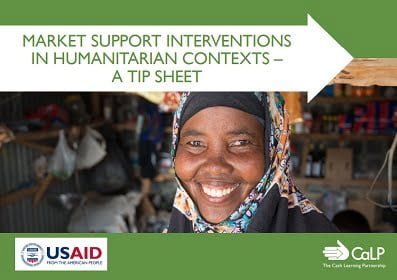
Market Support Interventions in Humanitarian Contexts – a Tip Sheet
Guidelines and Tools
This tip sheet defines what market support programming in humanitarian contexts is, and what it can look like in practice. It enables humanitarian practitioners to systematically consider market support interventions alongside other programme activities. The scope includes support interventions focusing on supply/availability and on demand/access. The tip sheet is based on secondary data...

Market Based Programming (MBP)
Guidelines and Tools
Market Based Programming (MBP) in Oxfam’s work means we always consider existing markets – through assessments, analysis and programming – across all phases of a response and across all technical sectors. You can also watch the videos below which are available in English, Spanish, Arabic and French.
Thematic lead
Latest
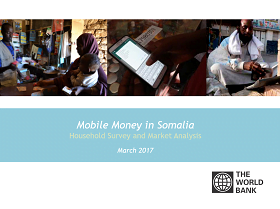
Mobile Money in Somalia – Household Survey and Market Analysis
Report
Key findings from an assessment of mobile money in Somalia. Provides information about mobile money penetration; practicalities; usage; perceptions and the use of shillings versus dollars.
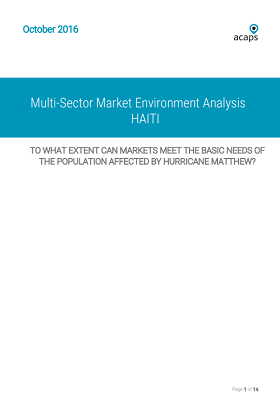
Multi-Sector Market Environment Analysis – Haiti. To what extent can markets meet the basic needs of the population affected by Hurricane Matthew
Report
Relief interventions in Haiti, including those to the 2010 earthquake, have been criticised for their (potential) harmful effect on the national market systems (ALNAP 2011 Humanitarian Coalition 2012). This multi-sector report intends to strengthen the understanding of the market environment in the...

Cash Transfers in Remote Emergency Programming
Guidelines and Tools
In emergencies with significant access challenges for humanitarian actors, the use of Cash Transfer Programming (CTP) has great potential to help provide life-saving support to the most vulnerable people. CTP may not require a heavy and consistent staff presence, is not subject to the same logistical...

Economic Impact of Refugees
Report
In 2015, the United Nations High Commission for Refugees accommodated over 15 million refugees, mostly in refugee camps in developing countries. The World Food Program provided these refugees with food aid, in cash or in kind. Refugees’ impacts on host countries are controversial and little...
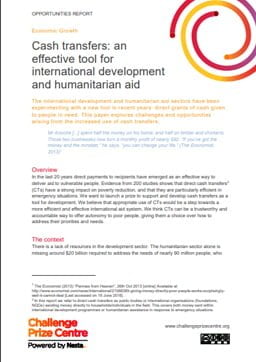
Cash Transfers: An Effective Tool for International Development and Humanitarian Aid
Report
In the last 20 years direct payments to recipients have emerged as an effective way to deliver aid to vulnerable people. Evidence from 200 studies shows that direct cash transfers (CTs) have a strong impact on poverty reduction, and that they are particularly efficient in emergency situations. This...

Future of NGOs: Smaller, more specialised, and more efficient
Blog Post
The WHS was far from a revolution. Yet the unprecedented place occupied by cash at the WHS shows the ball is rolling. Nigel Timmins, Oxfam International’s Humanitarian Director, reflects on what underlies our attitudes and how NGOs will need to focus on a set of core activities that reflect their...
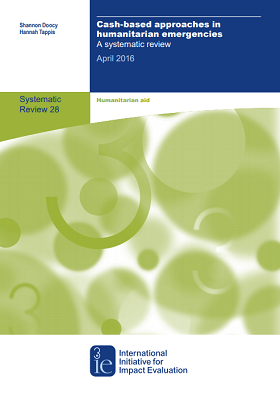
Cash-based approaches in humanitarian emergencies A systematic review. April 2016
Report
Humanitarian actors have a responsibility to ensure that assistance is provided in a way that minimizes risks and maximizes benefits to people affected by crisis. However, there are many challenges in evaluating ‘what works’ in addressing the needs of crisis-affected populations, and translating...

The Use of Cash Transfer for Livelihoods: Considerations and lessons learned
Blog Post
As the use of cash transfer programming increases, questions of how it can be used both to meet short-term relief needs and to contribute to recovery and longer-term development become more pertinent. In particular, the use of cash transfers to meet livelihoods objectives can be a highly effective means...
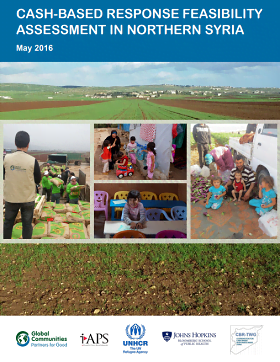
Cash-based Response Feasibility Assessment in Northern Syria
Case Study
As the conflict in Syria extends beyond the fourth year, there is need for a widespread humanitarian response focused on urban areas that addresses humanitarian needs and promotes resilience for the 13.5 million people in need of protection and humanitarian assistance within Syria. The majority of...

Cash and Markets In The WASH Sector
Report
Market based programming is increasingly heralded as having a critical place in the future of humanitarian programming. The proposed benefits of working through existing market systems include improvements to speed, efficiency and effectiveness of programming and increased beneficiary dignity and...

Market Analysis and Outcome/Impact Measurement in Cash Transfer Programming in the WaSH and Shelter Sectors in Sudden Onset Disasters
Report
Over the past five years, cash transfer programming has become an increasingly popular modality of humanitarian intervention. Recently, unconditional and unrestricted MPGs have been increasingly championed as a default modality, based on evidence collected by organisations such as the...

Economic Impact of Refugee settlements in Uganda
Report
Uganda is home to close to 800,000 refugees, mostly from South Sudan, Burundi and the Democratic Republic of Congo. It also has one of the most favorable and progressive refugee assistance programs in the world, with freedom of movement, work rights, and land officially set aside for refugees to...
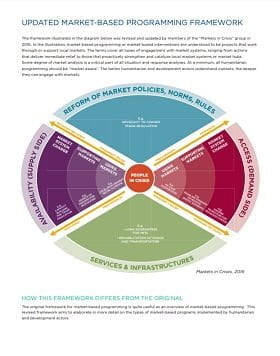
Updated Market-Based Programming Framework
Guidelines and Tools
The Market Based Programming framework was designed to help humanitarian actors understand market approaches in fragile contexts. Some degree of market analysis is a critical part of all situation and response analyses. At a minimum, all humanitarian programming should be “market aware”. The better...

Rapid Assessment for Markets: Bidibidi Refugee Settlement
Report
The Rapid Assessment of Markets (RAM) conducted within the Bidibidi Refugee Settlement and in the surrounding Ugandan towns and trading centres sheds some light upon the rapidly developing network of marketplaces within one of the world’s fastest growing refugee settlements. The RAM highligthed key...

Revised Pre-Crisis Market Analysis (PCMA)
Guidelines and Tools
The purpose of this guidance is to provide field practitioners, across the different sectors, with a practical step-by-step process of how to plan, carry out, and update pre-crisis market mapping and analysis, leading to response/programme design and implementation as well as surveillance, early...
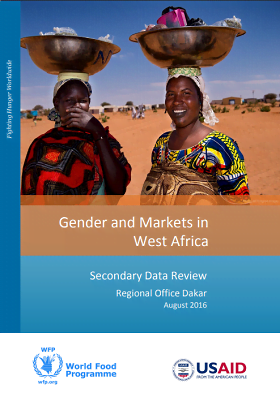
Gender and Markets in West Africa – Secondary Data Review
Report
The secondary information and data review presented here covers all gender and markets assessments conducted by WFP in West Africa, and market assessments conducted by key partners in the region over the past 5 years. The quality of the compiled assessments is reviewed to identify data and information...

Labour Market Analysis in Humanitarian Contexts. A practitioner’s guide
Guidelines and Tools
The world and the scale of complex crises are rapidly changing, thus calling for new tools and fresh approaches. This guide aims to help humanitarians conduct better labour market analyses (LMA) to inform the design and delivery of livelihoods and market strengthening programmes in emergency crisis and...
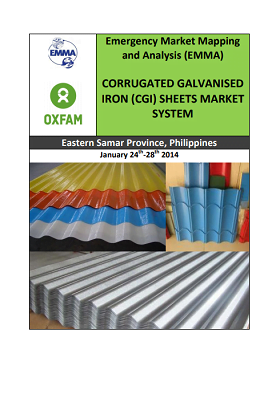
EMMA on CGI Sheets in Eastern Samar, Philippines
Report
Super Typhoon Haiyan (locally known as Yolanda) made landfall on the 8th of Nov’13 and left a trail of destruction along its path. It is estimated that 14 million people were affected and 4.1 million were displaced in the Philippines as a result of this super typhoon.Eastern Samar province of the...

What to know: working with humanitarians on e-cash programs
Report
International humanitarian assistance rose to a record US$24.5 billion in 2014. The 2015 Global Humanitarian Assistance Report indicated that over US$200 million of this was used in cash and voucher programs. An increasing number of humanitarian actors have begun to deliver cash electronically, through...
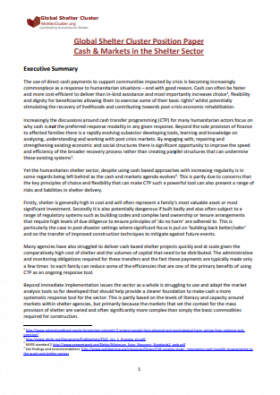
Global Shelter Cluster Position Paper: Cash & Markets in the Shelter Sector
Presentation
The use of direct cash payments to support communities impacted by crisis is becoming increasingly commonplace as a response to humanitarian situations – and with good reason. Cash can often be faster and more cost-efficient to deliver than in-kind assistance and most importantly increases choice,...



